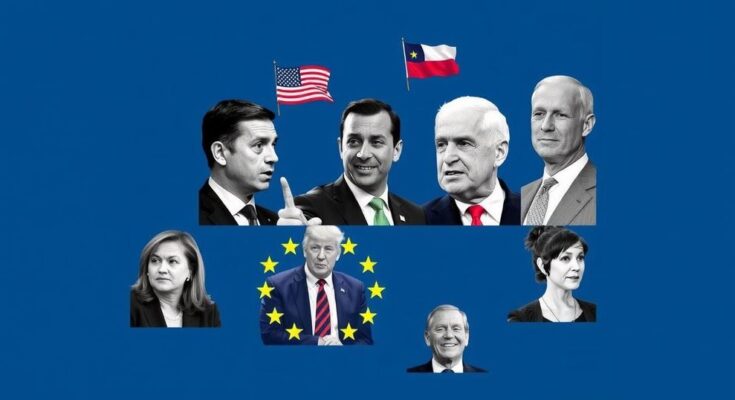America’s European allies are poised for challenging times irrespective of the presidential election outcome, facing uncertainties about ongoing support amid shifting U.S. priorities toward Asia and the Middle East. Concerns arise over possible diminished commitment from a potential Trump presidency, while Harris’s administration may also grapple with growing public war fatigue. The dynamics of U.S.-European relations are at a critical juncture, with both potential leaders indicating a future fraught with unpredictability and challenges.
As the United States approaches its presidential election, European allies grapple with uncertainties regarding their relationship with America, irrespective of the election outcome. The imminent election comes amidst the ongoing complexities stemming from Russia’s invasion of Ukraine, a crisis to which the U.S. has been a critical support pillar. If former President Donald Trump regains office, there are considerable concerns about his commitment to NATO and the broader European defense landscape. On the other hand, should Vice President Kamala Harris prevail, while a continuation of current U.S. policies can be anticipated, mounting war fatigue among the American public and increasing Republican opposition raise alarms that support for Europe could diminish over time. Furthermore, European officials express apprehension that whether under Trump or Harris, U.S. priorities may increasingly shift towards Asia and the Middle East, thereby relegating Europe to a secondary status. Rachel Tausendfreund of the German Council on Foreign Relations remarked on the shift in U.S. foreign policy focus, suggesting a diminishing role of Europe. The sentiments resonate with Germany’s defense minister, Boris Pistorius, who acknowledged the potential decline in U.S. engagement in European security matters. While some analysts believe continuity may exist under a Harris presidency, the strategic environment remains fraught with uncertainties, primarily due to the pressing concerns stemming from Asia’s geopolitical dynamics. Should Trump retake the presidency, the implications for NATO and European partners may be severe, as his previous terms were characterized by a transactional approach to alliances and an inclination towards trade tariffs that could exacerbate the economic difficulties within Europe. Such a possibility generates fears of a weakened U.S. commitment, particularly in the context of ongoing European security challenges posed by Russia. In this intricate scenario, the stakes remain high as the war in Ukraine progresses. European nations perceive this situation as a formidable existential threat, and they recognize the potential difficulties should U.S. support wane following a change in administration. Biden’s recent assertions during his Berlin visit stressed the necessity of sustained support for Ukraine, emphasizing the notion of alliances and the power of democracy. However, as the election climate intensifies, both domestic and transatlantic relations may face turbulence, resulting in unpredictably chaotic interactions between Europe and the United States. In conclusion, regardless of who occupies the White House, the immediate future could be marked by instability, particularly as Americans adjust to the outcome of the election, which is likely to invoke strong reactions nationwide. The implications of this election for Europe underscore a period of significant transformation in U.S.-European relations amidst broader global shifts.
The context of this article revolves around the implications of the upcoming U.S. presidential election on American-European relations, particularly focusing on ongoing geopolitical tensions such as the war in Ukraine and the shifting priorities of U.S. foreign policy. The article highlights apprehensions from European officials regarding the future of NATO alliances and U.S. commitment as these allies prepare for potential changes in leadership in Washington. Signs of growing fatigue over international conflicts in American public discourse add to worries about the sustainability of support for European security in the upcoming years. Furthermore, the backdrop of economic challenges faced by Europe exacerbates the uncertainty surrounding its reliance on U.S. leadership.
In summary, the United States’ presidential election is poised to significantly affect European allies, with concerns over reduced commitment to NATO and shifting U.S. priorities that may deprioritize European security. As the dynamics between Europe and America evolve, the upcoming leadership will play a crucial role in determining the future of these longstanding alliances, set against the backdrop of ongoing global challenges. Regardless of the election results, Europe must brace for potential turbulence in its relationship with the United States, as the implications of this election may trigger profound changes in the transatlantic partnership.
Original Source: apnews.com




